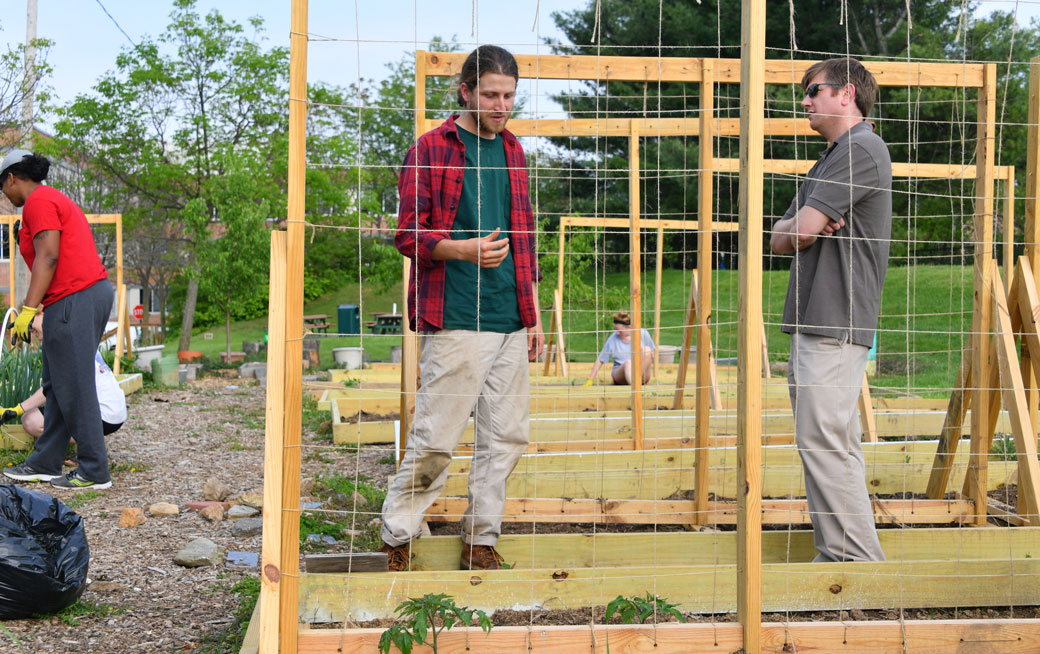From Admin building to Atwater’s: TU Urban Farm alumnus continues to grow
Anthony Dye ’13, farm manager for Atwater’s Restaurants, spoke with TU’s current crop of farmers.
By Kyle Hobstetter on June 8, 2017

When he started at Towson University in 2008, Anthony Dye never really had an interest in farming. He actually wanted to study organismal biology.
Nine years later, Dye has made his mark on Baltimore’s urban farm culture. He currently serves as the farm manager for Atwater’s Restaurants, which has six locations around Baltimore City and county.
Dye’s interest in farming began when he switched his major to environmental science. Through his classes, he gained interest in sustainable farming and organic agriculture and started working at the TU Urban Garden, located outside the Administration building.
It was there Dye has his first experience growing food. And since graduating in 2013, Dye has continued working at urban farms, including Atwater’s in southwestern Baltimore City.
“Being at Towson University helped me figure out what I wanted to do,” Dye said. “It connected me to people and allowed me to explore my interests, and I’m glad the Urban Farm was here because it was my first foray into growing food.”
TU English professor Ben Warner started a community garden in the neighborhood of Lake Walker. After watching that garden become a success, Warner though the TU students would enjoy it.
The TU Urban Farm started in 2009, with the first real growing season in 2010. Warner has served as the farm’s faculty adviser for eight years and since then has continued to watch the farm grow.
The farm has grown to include multiple crop beds and fruit trees, a shed for tools and supplies, an irrigation system, a communal meeting place, and a new composting bin.
As the farm continues to grow, so does the number of students who volunteer. Warner sees the garden as a great learning tool for all the student volunteers.
“It teaches so many important lessons in planning, community engagement, food-systems awareness and basic resourcefulness,” Warner said. “But I really hope that they form a connection to our ‘sustainability’ ethic, and take it out into the world with them after they graduate. That's not just about being organic growers—which we are—but about building and planning a diverse community set up to last into the future.”
Dye was one of those students who took those lessons to heart. Warner asked Dye to come to the TU Urban Farm to speak with the current group of students in late April to inspire the next generation. One of the students he talked to has contacted him to volunteer at Atwater’s Farm over the summer.
“That, to me, is a big connection,” Warner said. “I was hoping they would gain some basic understanding of the intensive urban farming, and Anthony’s message and instruction really hit home to what we do here at TU.”
For Dye, he hopes to keep seeing Towson University Urban Farmers in his professional career.
“I hope that some of the students involved with this go onto be a part of urban farming projects in Baltimore City and nationwide,” Dye said. “Some people who are involved at TU after me have begun to creep into my extended work social circle, and I think that’s cool.
“I hope it continues to happen, so long as they don’t end up taking my job.”
The Towson University students, staff and faculty can all participate in the TU Urban Farm. For those interested, there is a Facebook page, or they can e-mail Warner directly.
This story is one of several related to President Kim Schatzel's priorities for Towson University: Strategic Plan Alignment.